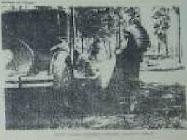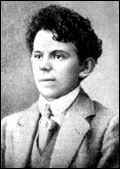BRIEF NOTE ON THE STATUS OF THE "I" IN AIEE! POETRY
This is a deep, complex topic which I doubt I will be able to manage in the space of a few furtive key-taps at work. Let's recall, first of all, that the "I" initiates the phrase "Internal Emigre-Emigre", which suggests that the "I" inhabits a condition of (perhaps internal, inner) exile, and that the "subject", therefore, is always "on the move", traveling.
The best analysis of the self and the ambiguity of otherness, in relation to the grounding principles of AIEE! Poetry, can be found in Elena Corrigan's 2000 monograph, Mandelshtam's poetics : a challenge to postmodernism (SUNY Press). Corrigan argues that M's poetry & poetics cannot be subsumed under contemporary theories of postmodernism. For Mandelstam, according to Corrigan, the self is neither simple, essential and unitary, nor illusory and effaced by otherness. Writing is a distinctive process which synthesizes both estrangement and growth. The self, the textual "subject", grows and changes through a process of affinity or "kinship" with other textual voices (see esp. M's essay "Conversation About Dante"). AIEE! Poetry, in turn, as a kind of American offshoot of Russian-Mandelstamian Acmeism, shares and endorses the orientation outlined in Corrigan's study. We can see the outlines of this position in the very lexical and phonic attributes of "AIEE!" itself. The "I" of AIEE! is necessary, distinct and inalienable : but it is meaningless without reference to its place in the sound & spelling of the word "AIEE!" as a whole. Thus the microcosmic wholeness of the "I" is echoed in the structural wholeness of the natural forms in which it has its being (the word "AIEE!").
What must be repeatedly emphasized, however, is that the word "AIEE!", in turn, while integral and multivalent as a word-in-itself, is deracinated from its primary meaning unless we recall the first principle of AIEE! poetics itself : that is, the notion that poets, through their compositional labors, participate in a unique and distinct mode of verbal expression, whose perennial and substantial qualities - the process of "transfigurement" sketched out in the initial AIEE! Manifesto - bracket and subsume more temporary and local and timebound forms of stylistic change, within an overarching system of (worldwide, with variations) tradition. Thus the articulation of AIEE! Poetics is itself, also, merely an epiphenomenon (of self-awareness) within the larger schema or milieu of poetic transfigurement.
Many also ask : is I the "I" in "AIEE!" really just... Henry? The answer is : this depends on your definition of "Henry". Obviously my own view (as a Henry) might be blurred by proximity - however, I can state with some confidence that the "Henry" delimited by AIEE! Poetry is only a symbolic model for the distinct, inalienable quiddity of every single poetic subject and object. Thus univeral Henrification is simply an abstract index of the mysterious actuality & architecture of created & creative Nature. It might be appropriate to characterize AIEE! Poetry as not exactly "Henryesque", but rather "henotic" - ie., "harmonizing, irenic" - deriving from the Greek work for "one" (Hen).
1.29.2009
Labels:
AIEE Poetry
Subscribe to:
Post Comments (Atom)



No comments:
Post a Comment